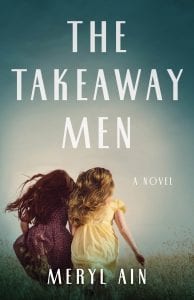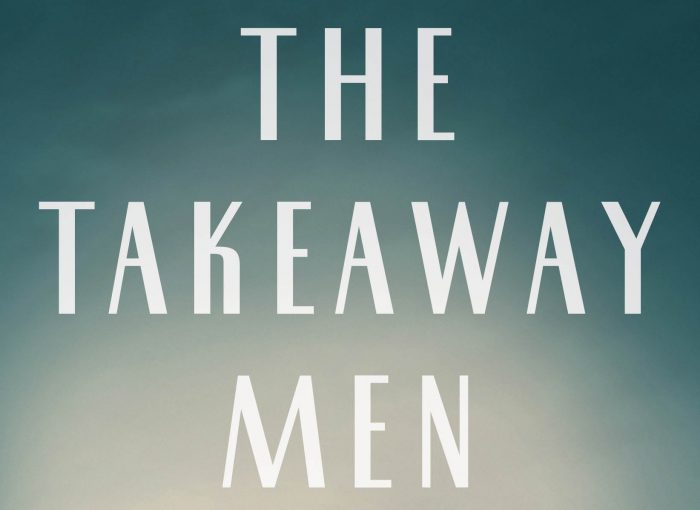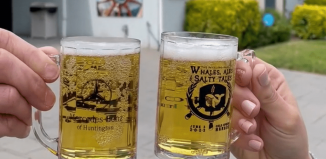Book Review: ‘The Takeaway Men’
Reviewed by Jeffrey Sanzel
We saw from a distance the open truck with children. Marta was standing next to me with her twin girls, who were five years old. The Gestapo was looking for more children. The girls screamed to Marta, “Mama, the takeaway men are coming, they’re going to take us away!” And they scooped up my little nieces, and the truck — loaded with children — drove off, and we never saw them again.

This vivid and disturbing description will come back to haunt Aron, a Holocaust survivor, in a very different way.
Meryl Ain’s The Takeaway Men (SparkPress) is an exceptional and vibrant first novel. It is the story of Aron and Edyta Lubinsky and their twin daughters Bronka and Johanna. It is a tale of painful secrets and complicated histories. It shows the shift in the United States and in the free world from the desire to find justice for the victims of the Nazi’s genocide to the paranoia surrounding the Red Scare during the Cold War. But The Takeaway Men is also a portrait of the power of love and the ability of family to embrace and heal.
The prologue takes place in Poland, 1942, at the threshold of the Holocaust’s darkest hours. It then briefly jumps to the displaced persons camp outside of Munich, where the twins are born on July 4, 1947. Finally, the main portion of the book begins in 1951, settling into Bellerose, Queens, where it plays out for the next eleven years. Here the Lubinski family is taken in by their only living relatives, Izzy and Faye. In 1908, at age twenty, Izzy had left Poland to escape an arranged marriage and a religious life. In America, he found a new path, opening up two bakeries, and enjoying both a more relaxed existence than he would have found as an orthodox rabbi.
And while the issues of fascism versus communism are part of the book’s political core, The Takeaway Men is truly a celebration of America. There is a deep appreciation of the United States as a country that welcomes refugees and it shares the message without preaching. It embraces the wonder of a free democracy to give hope to those fleeing tyranny and seeking a new life:
“You know,” [Aron] told Izzy, “in Europe, people think the streets are paved with gold.”
“Yes, I heard that rumor before I came here too,” Izzy said with a laugh. “America accepts people like us and gives us the chance to get ahead on our own merit — that’s what’s golden about it …”
But even here in America, Aron continues to be haunted by his past. When the neighbor Lenore is arrested by men in suits, he sees the shadow of the Gestapo. Lenore’s daughter cries: “The take-away men took Mommy away. When is she coming back?”
What is revealed is Lenore had a vague connection to Julius and Ethel Rosenberg, who were arrested, convicted, and then executed for espionage. The plight of the Rosenbergs is one of the many historical elements that are subtly introduced throughout the story’s arc.
 The Lubinskis remain with Izzy and Faye as the girls grow up. Aron has actively chosen not to reveal his nor Edyta’s history to the girls. But several incidents, including a fascinating scene in which a Hebrew school teacher shares what she feels is necessary knowledge, the publication of The Diary of Anne Frank, as well as a suspected Nazi working in the neighborhood, force some painful and startling revelations.
The Lubinskis remain with Izzy and Faye as the girls grow up. Aron has actively chosen not to reveal his nor Edyta’s history to the girls. But several incidents, including a fascinating scene in which a Hebrew school teacher shares what she feels is necessary knowledge, the publication of The Diary of Anne Frank, as well as a suspected Nazi working in the neighborhood, force some painful and startling revelations.
In addition to the central characters, the book is populated by characters richly drawn in all their human complexity. Izzy and Faye’s mentally troubled daughter, Becky, returns to the fold, introducing someone who has a capacity for great love but is chased by demons of her own.
Jakob Zilberman, a gregarious friend, survived as a member of the Sonderkommando, the prisoners who were forced to work in the gas chambers and the crematorium. Unlike Aron, he is compelled to speak out on his experience. He is another man plagued by not only what he witnessed but by his own actions: “I would prefer to tell you another story, one in which I look brave and fearless. I would prefer a story where I was a hero and saved people. But that wasn’t possible in those circumstances, and I wouldn’t be honest if I embellished what really happened to make myself look better.” Ain gives us more than a hero: she gives us a human being.
And, at the novel’s heart are the twins, Bronka and Johanna, as they grow up and grow apart but never lose their bond in this every changing world.
Many of the characters struggle with their religious and ethnic identities. Izzy and Faye’s son has married outside the faith and it is a fascinating study of conflict to see the parents try to find a way to accept this without losing their own cultural commitment. The issue of what it is to straddle the Jewish and non-Jewish worlds is addressed without judgment. The question of how to belong and yet not lose one’s sense of self is raised in all its contradictions. “It was easier to be a Jew in America than in Poland, but it still wasn’t easy … when you’re a Jewish immigrant in Bellerose, you don’t quite fit in, no matter how many Christmas carols you know.”
There is a refrain in the book that references the biblical Ruth. Ruth, who was not Jewish but married an Israelite, in widowhood remains with her mother-in-law. The idea that “whither thou goest, I will go” resonates throughout.
Ultimately, The Takeaway Men is not just about family — it is about a neighborhood and a community. It is about the choice to survive even if you must make great sacrifices in the process. But finally, it is about finding that acceptance comes from understanding and understanding is what can make one whole.
Available Aug. 4, The Takeaway Men may be pre-ordered at BookRevue.com, BarnesandNoble.com and Amazon.com.







